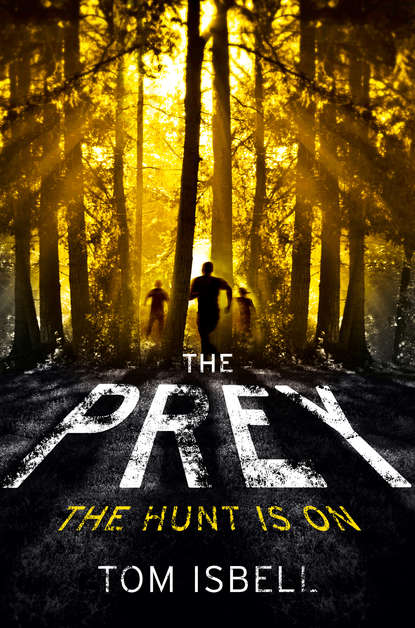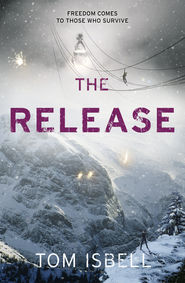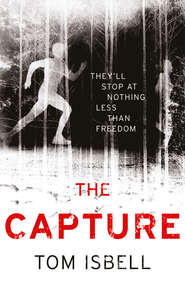По всем вопросам обращайтесь на: info@litportal.ru
(©) 2003-2024.
✖
The Prey
Автор
Год написания книги
2019
Настройки чтения
Размер шрифта
Высота строк
Поля
I stripped the paper from the typewriter’s roller. For obvious reasons, I neglected to mention the boy’s whispered message. I walked the report over to Major Karsten’s office and left it with Sergeant Dekker.
“Slice slice,” he said with a sneer, enjoying the in-joke that—thankfully—only a couple of us understood.
My face burned and I got out of there as fast as I could.
Days passed. Rumors flew. Some claimed the boy in the black T-shirt was a convict on the run. Others said he was no outlaw, merely an LT from an adjoining territory.
What I couldn’t figure out was why he was in the middle of the No Water in the first place, on the outskirts of an orphanage.
That’s what Camp Liberty was, although in official Republic jargon it was called a “resettlement camp.” There were several hundred of us, all guys, most with birth defects brought on by Omega’s radiation. Those toxic clouds remained floating above the earth like Christmas ribbon encircling a present, just waiting for someone to tighten the bow.
Our poor mothers had been doused with so many gamma rays or alpha particles or whatever it was, that they brought us into the world with one too many fingers or one too few or shriveled arms. Or, in my case, one leg shorter than the other. And then they died shortly after giving birth.
It was never clear how it all began. Some say a group of no-goods on the other side of the planet got hold of weapons of the nuclear kind. Others claim our own allies were to blame, attacking countries who then counterattacked. However it started, a dozen nations ended up shooting off nuclear warheads like it was the Fourth of July, until every major city in the world was obliterated. Utterly wiped out.
Of course, since all this took place a good twenty years ago, we had to rely on what the soldiers told us. Which wasn’t always accurate.
It was the other camps I wondered about. They had to be out there, right? There were rumors, of course—grisly tales of torture and atrocities—but who really knew what was true and what was made up.
“John L-183?” A Brown Shirt was standing by my table in the mess hall.
“Yeah?”
“The colonel wants to see you.”
My fork lowered. Whenever Colonel Westbrook asked to see an LT, it usually meant one thing: punishment. Was it the false report? Had the colonel somehow figured out the boy had told me more than I let on?
“Maybe you’re going through the Rite early,” Flush suggested. I shook away the notion. No one graduated until they were seventeen. I still had another year.
“That’ll teach you to read so many books,” Dozer said, snorting. He was a barrel-chested LT who could never be accused of reading books.
The acne-scarred soldier waited for me to get up. Like all the soldiers in camp, he wore a uniform of black jackboots, dark pants, and a brown shirt. That’s why we called them Brown Shirts. We were clever that way.
I left the mess hall feeling like I was headed to my execution. Sunlight blinded me as we crossed the camp’s infield. Above us, the flag atop the pole cracked in the wind like a whip. Snap. Snap.
We approached the headquarters, an ancient, rotting log building that sat in the middle of camp like a festering sore. An older Brown Shirt sat hunched over a sheaf of papers, a sweaty sheen covering his face.
Three straight-backed chairs lined the wall. To my surprise, one of them was occupied. It was the boy from the No Water.
Even though I’d helped save the guy’s life, he didn’t offer a word of thanks. Didn’t even acknowledge my presence.
The door to an inner office opened and out stepped Colonel Westbrook. He was of medium height with an unimposing face, his dark brown hair styled in a kind of comb-over across his skull. Like all the officers, he wore a dark badge on his left sleeve. It sported the Republic’s symbol: three inverted triangles.
I must’ve seen the colonel a thousand times, but never up close. For the first time I noticed the blackness of his eyes. There was not a bit of color in them at all. My heart was in my throat as I followed him to his office.
There were two others in the room as well. Sergeant Dekker, wearing his customary smirk beneath his oily hair, and Major Karsten, sitting ramrod straight by the window. Perspiration trickled down my side.
Westbrook’s eyes focused on a manila folder opened before him. His finger traced one line of information after another. “You’re John L-183,” he said at last. “The one they call Book, yes?” He said my name as though it was something unpleasant tasting.
“That’s right.”
“Nothing to be ashamed of. We need more scholars. They’re the future of the Republic.” His tracing finger halted, and I knew exactly where he’d gotten to in my life history. Blood rushed to my face.
“Liberty has a new member,” he said, his coal-black eyes boring into me. “We want you to show him around. Any problem with that?”
“Um, no, sir.”
“Get him situated. The sooner he’s one of us, the better for all concerned.”
“Yes, sir,” I said, relieved. This wasn’t a punishment after all.
“And, Book?” Colonel Westbrook leaned in, his fingers splayed on the desk like talons. “See what you can find out. Where’s he from? He’s got no marker and we don’t know much about him. After all, if he’s in need of help we have to know what he’s been through. You can understand that, can’t you?” A pointed reference to my own past.
“Yes, sir,” I said. “But I don’t want to rat on people.”
“It wouldn’t be ratting. It’d be informing.” He smiled grimly. “It’s very simple, Book. You help us, we help you. And who knows? A year from now, when you go through the Rite, we might look into making you an officer.”
Put that way, it didn’t seem so bad. And it was true: I did know a thing or two about secrets. “Okay,” I said.
“It’s settled then. I’ll have Major Karsten check in with you from time to time.”
I looked up at the major. The scar that edged from his eyebrow to his chin seemed to pulse like a living, breathing thing.
I couldn’t get out the door fast enough.
4. (#u08ac49f2-464f-5853-bbc4-8da0dc9e7638)
HOPE KNOWS HE’S DEAD the moment she returns from watch. Faith is tucked into the curve of their father’s body, her tears soaking his shirt.
Hope places her fingers against the crook of his neck. Cold to the touch. No hint of a pulse. It hits her like a punch to the gut.
“Come on,” she says, pulling her sister off.
“We have to bury him,” Faith says, eyes red.
“I know.”
“How’re we going to do that? We don’t have a shovel.”
“We’ll think of something.”
“But what? We can’t leave him like this.”
“I know that …”
Faith is screaming now. “We have to do something! What’re we gonna do?”
Hope slaps her sister hard across the face, regretting it instantly. Faith’s head snaps to one side, the red imprint of Hope’s fingers tattooing her face.







